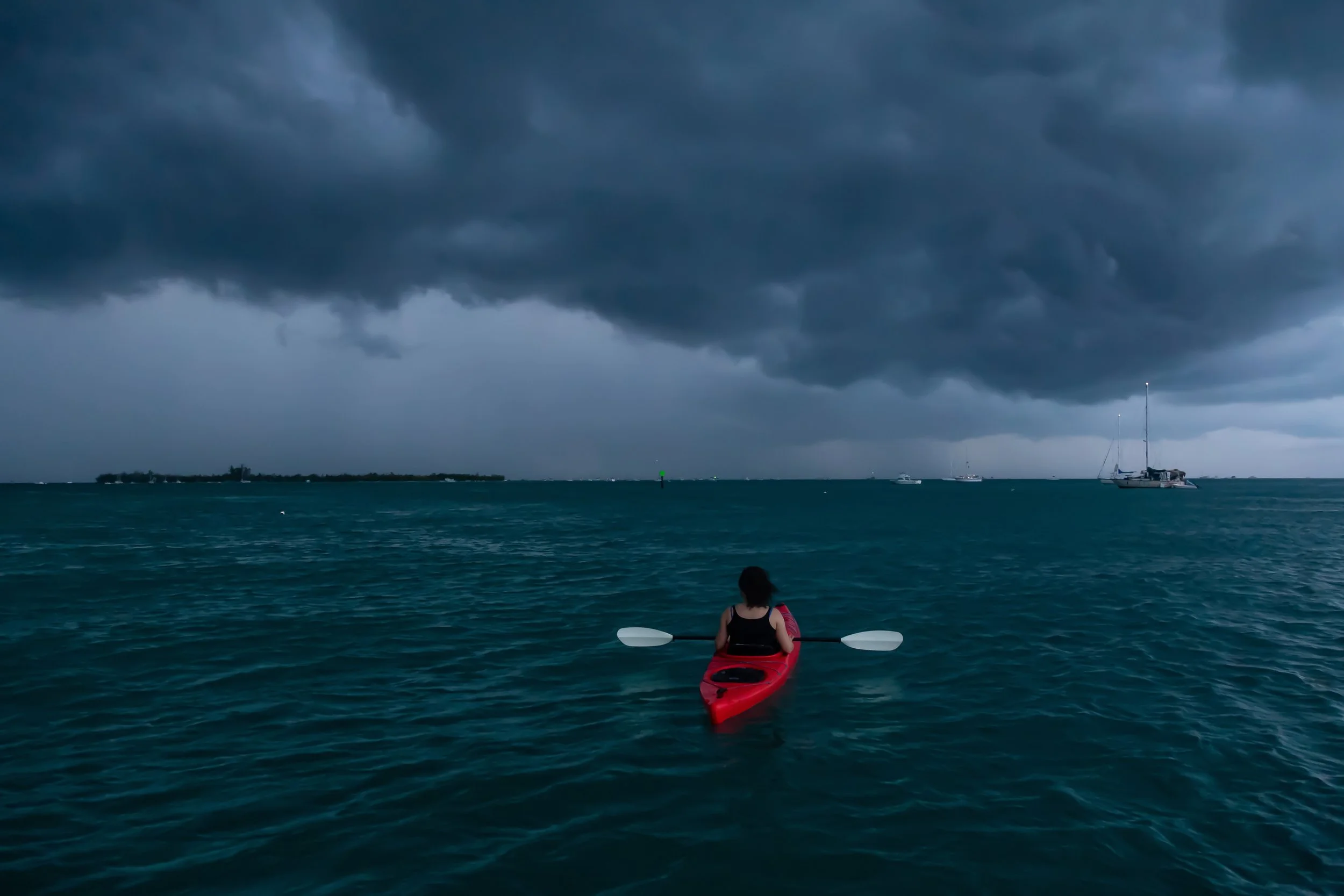Why the Sea is Creepy AF: A Collaboration between Dai & Kayla
Why the Sea is Creepy AF
A Collaboration between Dai & Kayla
As many children do, I spent a lot of time at my grandparents’ house. These were the days before streaming, and the TV selection was limited, so I was left with two VHS tapes to watch over and over. The first was The Wizard of Oz. The second was a documentary about sharks my grandparents had recorded.
There are moments from the documentary that have stuck with me until this day. A tiger shark breaching the waves to snatch young seabirds taking their first flight. A great white bites a seal in half, taking the lower half with it and leaving the upper floating in the water, glassy-eyed with skin and flesh hanging in tatters. A small fish is swimming peacefully alone when a nurse shark, perfectly camouflaged in the sand, lunges up and swallows it whole.
On family trips to the seaside the adults around me warned that we could only spend so much time on the beach each day before the tide came in. I had visions of the sea rushing up the beach and sweeping us away if we were still there at 4 o’clock. Later at school when I learned the moon controls the tides, it cemented their terrible mystique in my mind.
I, too, have pretty much always found the ocean to be completely, utterly terrifying.
It’s incredible. It’s awe-inspiring. It is…pants-shittingly scary.
Unlike Dai, I didn’t get to go to the ocean much as a kid. Or as an adult, really. The closest thing I currently have is the Gulf of Mexico, and the Gulf down on the Mississippi Coast is brown and extremely shallow – at least for a while, until you hit the buoys marking a steep, sudden drop-off.
That’s part of it for me, though. That sudden plunge into depths unknown. The thing is, it’s not even the “unknown” part that scares me the most, necessarily. I know that the ocean is full of beautiful, unimaginably dangerous creatures. That’s part of the appeal, honestly! The ecosystems and creatures of the world’s oceans are spectacular and frightening in equal measure, from deceptively ethereal jellyfish to…not-so-ethereal specimens like the giant isopod (which makes me physically cringe just thinking about, bless the little guys).
The thing that really gets me about the ocean, though, is how big it is.
Absolutely, just watching clips of divers descending into dark waters, or looking at photos taken at the surface where you can’t see the bottom or any land, fills me with existential dread.
Yes! It’s the sense of utter disorientation and disconnection, I think. As you know, I recently found out I have vertical heterophoria (a type of binocular vision disorder), so I’m really prone to disorientation and vertigo as it is. I think about it sometimes, what I would do if I was stranded on a boat in the middle of the ocean with nothing but waves as far as the eye can see. The thought of it genuinely makes me queasy. That feeling of being completely untethered from any kind of directional reference point is just…ugh.
The idea of being lost under the water is terrifying, too, but in a slightly different way. When I think about being in the ocean (or any body of water, to be perfectly honest) and what all could go wrong, it’s not the disorientation that concerns me. This is where the sheer volume of water around me becomes the most immediate threat to both my body and my sanity. The idea of the current being too strong, the waves too big, my body too heavy to make it to the surface again? More than that, the idea that it could happen by total accident, or as a consequence of my own hubris, somehow makes it worse. How easy would it be for me to slip up and have to come face to face with the inevitability and inescapability of the sea?
One thing I will say is that thinking about what lurks under the depths doesn’t actually frighten me all that much, especially in comparison. If anything, I find that aspect of oceanic life utterly captivating. The ocean is fucking weird, y’all, and the deeper you go the weirder it gets. That said, there’s something almost comforting about the strangeness of the creatures down there. That even in the most extreme, dire conditions, life manages to not just survive, but adapt and thrive.
The science of it doesn’t really factor into this metaphor, because humans and most aquatic beings typically aren’t anything remotely alike in terms of biology. But, like us, they are still alive. Even when it’s difficult, and even when no one else can see. That’s pretty damn cool.
(You still won’t catch me sailing around the ocean, though, especially in the Pacific. You know you can look at a certain angle of the earth and see nothing but the Pacific Ocean? I think the fuck NOT.)
I think we would be remiss to discuss the sea without talking about climate change. We are collectively sleepwalking into disaster, and the oceans will form a large part of that. Almost every day there are reports of the effect of rising sea levels, and for some my nightmares of being swept away are an imminent reality; the Pacific nation of Tuvalu, for example, is at its highest point only 15ft above sea level, and could be uninhabitable within 50 years. Tuvalu shares this threat with Fiji, the Maldives, the Marshall Islands, and many others.
This, along with coral bleaching, overfishing, and the increased salinity of the ocean is killing off marine life. The seas are rising for us, and they are full of the dead. We are being washed away by dead waters, and I don’t know about you, but this terrifies me.
It’s interesting that you bring that up, actually – as someone living close to the Mississippi Gulf Coast, the slowly-encroaching sea isn’t a foreign concept to me at all. The coastal wetlands of Louisiana, my neighboring state, are eroding at roughly a football field per hour according to some calculations. Each year, hurricanes blow through with the force of an angry god – and sometimes dredge the long-buried past to the surface on their way out.
Even the Dead Cannot Escape Climate Change | Scientific American
There’s something horrific about those we’ve laid to rest being brought up from soil. Aside from the macabre imagery, it is a visceral reminder that we are but one spot on a continuous loop of time, building our lives on the bones of those who came before us, and that there are real, physical forces in this world that are powerful beyond our comprehension.
In the discussion of climate change, the increase in frequency and severity of these events are also reminders of our own mistakes. We are destroying the earth as we know it and, in turn, destroying ourselves. While they are reminders, however, don’t mistake them for retaliation. While we have brought a lot of this on ourselves, there is no actual malice in the rising tides.
The sea does not seek vengeance. It is not wrathful. It simply is.
That’s what gets me more than anything. The knowledge–and accompanying existential terror–that comes from knowing that the sea, like death itself, is a truly neutral entity, and we are so very small in comparison.
We see the water as a cleansing thing, but that does not mean it is gentle. We would do well to remember that.
_____________________
Kayla Martin-Gant (she/her) is a queer disability advocate, full-time librarian, and lover of all things spooky. She wrote her first story, called The Haunted Dollhouse, when she was seven years old and received rave reviews from the playground crew. You can find her yelling about various and sundry things on Twitter at @poultryofperil.
Dai Baddley (he/him) is a Queer Welsh trans man and a sick bastard. Once in Primary School he upset his teacher by drawing zombie lab experiments. You can catch him on Twitter @PrepareToDai




